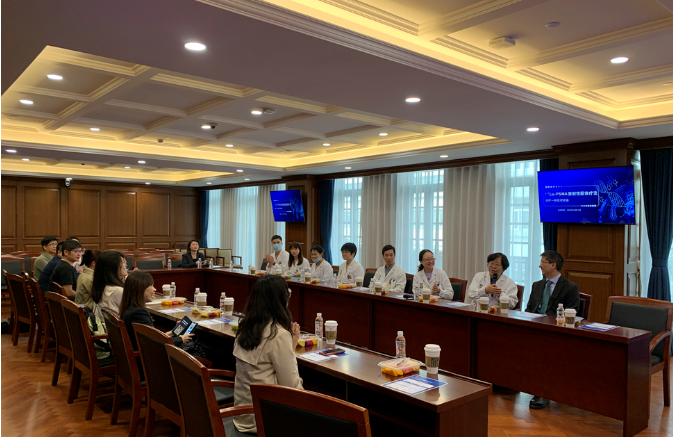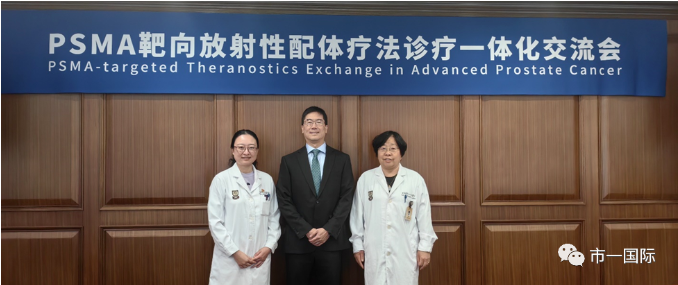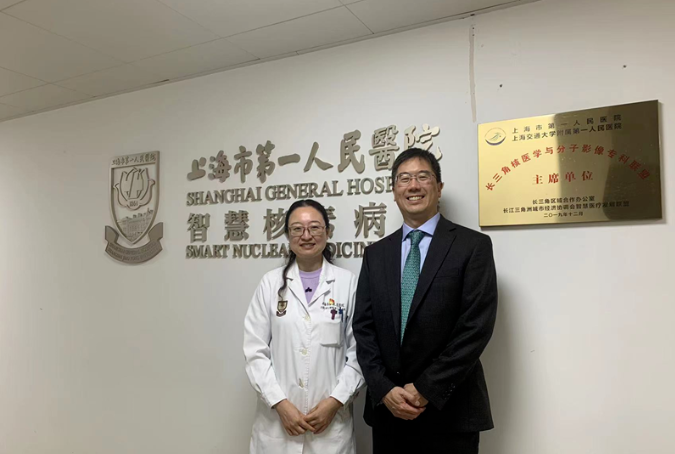- News
PSMA-Targeted Theranostics Academic Exchange with University of Arizona in Advanced Prostate Cancer Conducted in Shanghai General Hospital
Link of the original article: https://mp.weixin.qq.com/s/V_U_FWfdEYKSgH14oYFtnA
Recently, expert team from Nuclear Medicine Depeartment and Urinary Surgury of Shanghai General Hospital invited Professor Phillip H Kuo from University of Arizona to Gongji Building for an in-depth 177Lu-PSMA targeted theranostics exchange in advanced prostate cancer.

In the opening speech, Professor Zhao Jinhua first highlighted that this academic exchange between Chinese and American scholars in nuclear medicine is of great importance to both the high-quality development of radioligand therapies and building a better medical platform. Moreover, Zhao also made a remark that such cooperation helps to set a new pattern for tumor treatment and adds vitality to the development of radioligand therapy in nuclear medicine disciplines as well.

Prof. Xing Yan then made a speech on the development and construction of Nuclear Medicine Department of Shanghai General Hospital, introduced the expert team and key clinical research of the department, and noted the application of new PSMA imaging probes and targets in the whole process of prostate cancer diagnosis and treatment. In addition, she also introduced the cooperation between Nuclear Medicine Department and the core clinical team from the Urinary Surgury Center led by Prof. Han Bangmin, Vice President of Shanghai General Hospital, and shared the experience on the diagnosis and treatment process as well as the medication of the clinical application of Lu-PSMA RLT for prostate cancer treatment.
Prof. Phillip H Kuo noted at first that the 177Lu-PSMA-617 treatment for mCRPC in the global VISION research extended 4 months and 5.3 months in the OS and rPFS of the patients respectively compared to standard therapies; Then he shared the experience learnt from mutiple American hospitals in prescription, treatment, and recovery time after the application of RLT; Besides, he also gave an introduction on the latest research progress as well as other ongoing research area.
After a heated discussion, Prof. Phillip H Kuo was shown around the Smart Nuclide Ward set up by our Nuclear Medicine Department where creative RLT mode was innovatively established and treatment efficiency has been significantly improved by applying intelligent ward rounds by robots which detect vital sign timely so that quick response can be made to the patients. Besides, robots are also applied in prescription, distribution and santitization which prevents both medical workers and patients from radiation explosion to a large extent. Seeing all these facilities, design and achievements, Prof. Phillip H Kuo highly appreciated the vigorous development of nuclear medicine in China and the RLT mode efficiently functioned in Shanghai General Hospital, and hoped that he can learn more and thus promote the mode widely.

Both Prof. Phillip H Kuo and our experts hope to start mutual cooperation from PSMA radioligand therapy and then advance exchanges in other nuclide therapeutic areas by means of multidisciplinary cooperation, thus benefiting Chinese patients with constantly improved radioligand therapies.
